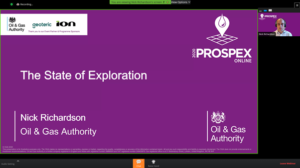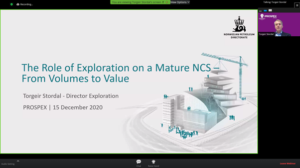Prospex 2020: Successfully Ensuring Communication Continues

The first fully virtual major event held by the Petroleum Society of Great Britain (PESGB) successfully brought together speakers and delegates to discuss national and international opportunities, challenges and developments in the energy industry.
Firstly, congratulations are in order for the PESGB team who very successfully pulled off their first virtual Prospex conference and exhibition, which was held 15 – 16 December, 2020. An average of 300 delegates signed up and all the talks were interesting and well with good attendances.
All the usual Prospex features were there, with some great introductory keynote talks on the state of exploration in the UK and Norwegian Continental Shelves, as well as many ‘Prospects to Go’, primarily from North West Europe but also from as far afield as Australia. There were a number of talks covering the energy transition, including an in depth analysis of the UK’s progress towards net zero given by O&G UK, while several presentations concentrated on maximising oil recovery from mature fields and using existing infrastructure.
Opportunity and Variety
The sessions on Day 1 stayed close to home and focused on areas ranging from the West of Shetlands, Central and Southern North Sea to the East Irish Sea. Oil and gas opportunities with significant potential P50 reserves were described with objectives ranging from Palaeocene stratigraphic traps in the West of Shetlands to Carboniferous plays in the Southern North Sea’s Silverpit Basin.
Day 2 had a more international flavour with diverse prospective areas ranging from the Faroe Islands to North Africa, North America, Jamaica and Australia. Some were relatively early exploration cycle opportunities requiring further seismic to firm up prospects, whilst others were fully developed and scheduled for drilling with or without further farminees.
There were some larger companies promoting their prospects such as CNOOC, which had large acreage positions for offer in Atlantic Canada as well as gas development opportunities in Gabon. Several ‘overlooked’ prospects such as Azinor’s Goose Prospect in the Outer Moray Firth and Sound Energy’s Triassic sub-salt plays in Tunisia were described, demonstrating how another look with fresh eyes might deliver dividends for the explorer. Some frontier areas, such as offshore Jamaica, reminded us of how underexplored some basins are, with as few as 11 wells drilled in an area of over 22,000 km2. Mature areas were also showcased, such as the west coast of America, where California Resources has over 130 producing fields. The prospects here are often shallow and offer rapid cash flow and reserve growth, with drill to first production typically taking 20-60 days.
The final session of the conference covered a range of talks including advice and reassurance for geoscientists impacted by recent events. Presentations such as Halliburton’s, which looked at adopting traditional exploration techniques to screen carbon capture and storage locations, supported the premise that our geoscientists have all the key skills required to participate successfully in the energy transition. Technology and data were also showcased with presentations on how to get maximum value from the Public Data Repository (PDR) and also how AI can help when there is simply too much data to interpret.
Organisational Success
The platform used to host the conference, Whova, worked very well, especially as it could be accessed via both computer and mobile app. Each delegate was able to provide a personal profile with a short bio, contact information and social links, while communication between participants was facilitated by open discussion boards and private messaging and video calling. With only a couple of exceptions, the connections to the speakers, moderators and organising team worked seamlessly, as did movement between presentations. In addition, the platform was easy to navigate.
Time-keeping is always an issue at conferences but all the presenters seemed to keep to their allotted time, even though 15 minutes is not very long to explain a prospect that really excites you. Possibly the knowledge that the moderator could literally switch you off at the end of your time was a motivation not to over-run! There was even time after most presentations for a vigorous Q&A session. These worked better than at a live event, not only in that the more reticent delegates felt able to ask a question in writing, but also because, although as usual there was only time for each speaker to answer a couple of questions, they were able to return at a later point and answer the questions in detail in writing for all to read.
While virtual exhibitions are not quite the same as having a physical booth, PESGB encouraged delegates to visit the exhibition and made networking with exhibitors easy and simple to use. Being able to have the logo and website and contact links available of the booth was helpful, and in GEO ExPro we appreciated the opportunity to run a raffle through the virtual stand, which encouraged more people to make contact with us. The demo talk offered prior to the conference was also helpful.
A Virtual Pub!
Networking is always a vital part of conferences like Prospex, and also one of the hardest things to replicate in a virtual environment. To this end, the PESGB made a valiant effort to encourage delegate participation and interaction, with frequent ‘coffee breaks’, during which we were encouraged to visit the exhibition and contact speakers or other delegates who had made interesting points.
At the end of the conference, we even had the traditional visit to the pub, albeit still virtually. The virtual ‘Steam Passage’ (a pub close to the Islington Design Centre, where Prospex is usually held) had breakout rooms with names such as ‘Queueing at the Bar’ and ‘Outside with the Smokers’, complete with suggested topics of conversation, from discussing the good old days, to ‘holidays I didn’t take in 2020’! All very entertaining and it seemed to work well, with some people flitting between rooms and others staying in one virtual place and having a good chat.
So overall, while all of us are looking forward to meeting in person at conferences again in the not too distant future, through Propsex the PESGB did an admirable job of ensuring that communication and education continues, even in these strange times.

Iain Brown and Jane Whaley
GEO ExPro Magazine

